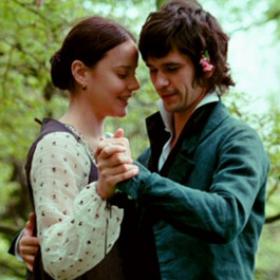Bright Star

2/5
Ever since she stumbled on screen as that lost little girl in Somersault, actress Abbie Cornish has been campaigning hard to be accepted as a serious thespian. She has talent, no sentient being would deny that, and yet going into the release of Bright Star she still has not become a household name (despite being blamed from homewrecking Reese Witherspoon’s marriage) nor has she become a critical darling (despite being able to act circles around, ahem, Scarlett Johanssen). However, now that the movie is out and she seems to be coasting towards a Best Actress nomination at the Academy Awards it appears that Bright Star, directed by Jane Campion, seems to have accomplished for her what Stop-Loss, another, better middle brow weepy directed by a woman, could not. Cornish plays Fanny Brawne, lover/muse of John Keats (Ben Whishaw), famed Romantic poet known for his "A thing of beauty is a joy forever." line. The film tracks their affair, which is, by turns, scorching hot, terribly frustrating, and eventually depressing.
As is seemingly the case with every story that takes place in 19th Century England, this one revolves around a love affair that is suffocated by archaic social norms and a monied class that is trying to keep the riffraff out. The Brawne family is rather well off and even though Fanny is totally smitten with Keats they work hard to put the kabosh on it, because, as Fanny’s mother so eloquently puts it, "He has no income." Campion, never a master storyteller, once again manages to shank what should have been a slam-dunk. She leans hard on her class warfare conceit so that her energies can be focused on creating a pretty picture that has a thick, ornate atmosphere. The director seems totally in her element as we watch the seasons change, but what that actually contributes to the film is unclear. It appears that as long as she keeps the on screen imagery decadent then she has an excuse for remaining tone deaf to her characters emotions. To Campion the story is, of course, the butterflies and just how beautiful they are not the extreme pain that Fanny is in.
The character of Charles Brown (Paul Schneider), Keats’ best friend, is also fumbled as his humanity is stripped away and he is reduced to a one-dimensional hater of all things Fanny. His stake in the matter is his work because Keats also serves as his writing partner and that is seemingly a more understandable motive than the one presented by the evil money grubbing Brawnes. When Keats does the natural thing and begins slanting towards Fanny and away from poetry Brown becomes a possessive cockblocker who counters everything she represents (love, pain, passion) with a cold intellect. Of course all the possessiveness in the world can’t prevent what the cruel hand of fate has in store for Keats, namely a fatal case of consumption. And as he slowly slips away Campion finally steps up her game and begins to treat her subjects with a poetic compassion.
Fanny, staring the death of her lover dead in the eye, comes off as a tragic character, an undying lover whose single minded devotion is now outdated. At moments like these, along with a few earlier scenes that exude wit, the film soars, but those moments are so rare that they cannot overcome the stifling mess that surrounds it. Campion is perhaps a tad too avant-garde for a mainstream audience. The way she illustrates the dichotomy between the simultaneous feeling of unimaginable bliss and hopeless incarceration that somebody feels when they are freshly in love is, in its own way, perfect. With the added dimensions of conflict, real conflict that is, and a plot that hums as opposed to plods she could once again rise to the top of the Hollywood hierarchy. For this film though, we’ll give her an A for effort and a C for execution.
Starring: Abbie Cornish, Ben Whishaw, Paul Schneider, Kerry Fox
Director: Jane Campion
Writer: Jane Campion
Runtime: 119 minutes
Rated: PG
Distributor: Pathe
RELATED ARTICLES
Get the most-revealing celebrity conversations with the uInterview podcast!







Leave a comment